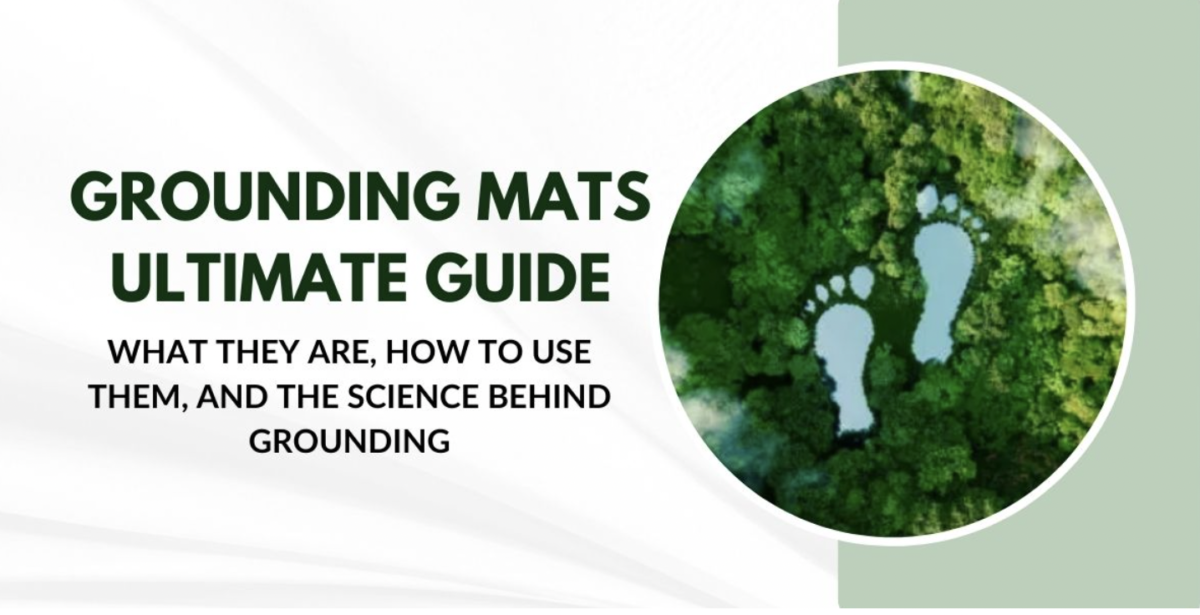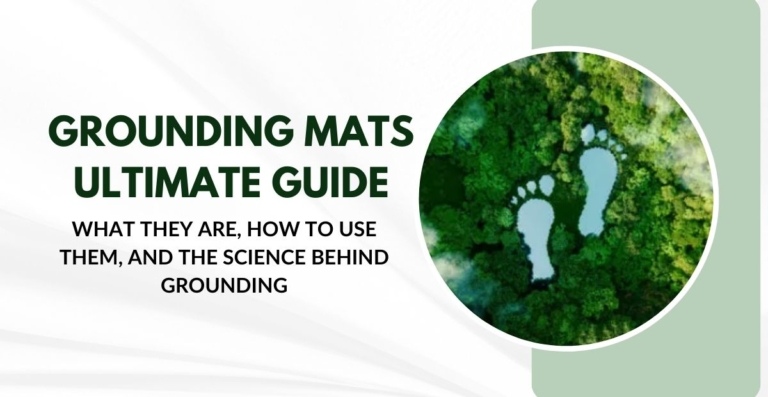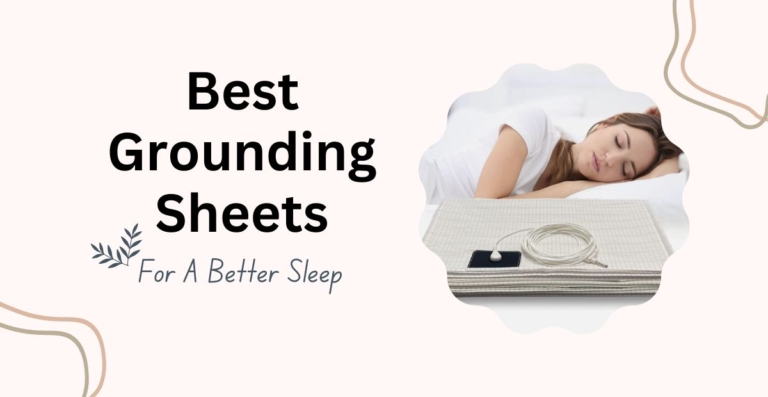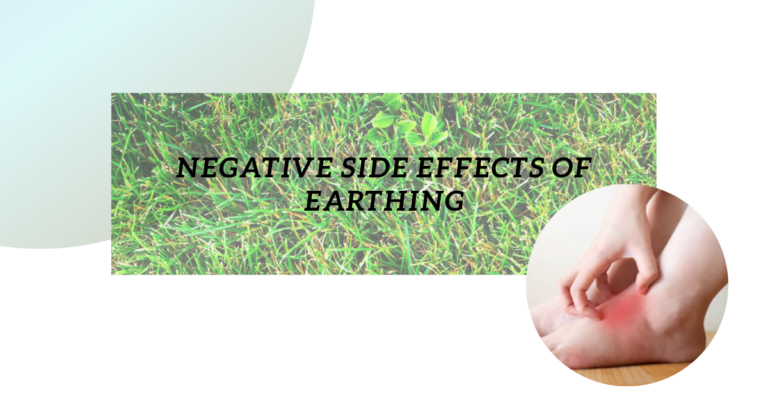The Science of Grounding Debunked| Deep Dive Into the Evidence
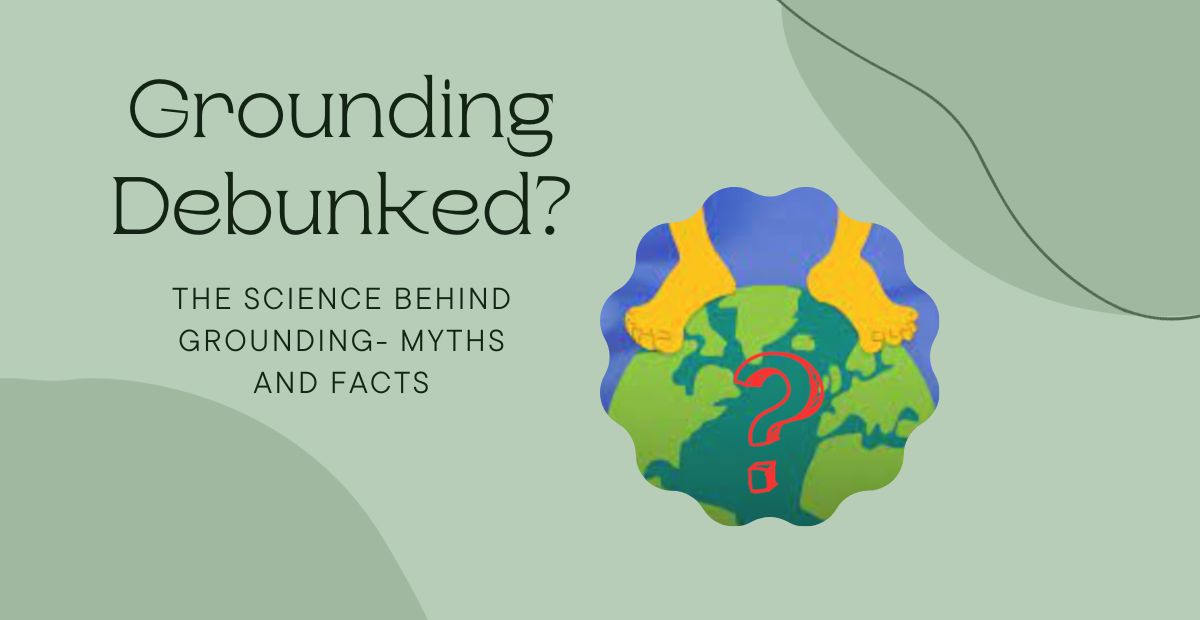
Grounding, also called Earthing, has gained a lot of attention in the past few years and has certainly caught my attention (thanks, TikTok).
When I first started looking into the whole grounding thing, I was pretty skeptical. I heard that it can help me sleep better, have more energy, and reduce inflammation.
My background as an MRI Technologist has given me an understanding of how our bodies interact electromagnetically with the outside world.
I use these electrical interactions between our bodies and MRI equipment on patients all the time.
Can our bodies also interact with the electromagnetic properties of the Earth?
It almost seems too good to be true.
Is the science of grounding debunked? I did a deep dive to find out.
In this post, I will cover what grounding is, if there is any science to back up its claims, and if people are actually experiencing any of the claimed benefits.
What is Grounding?

Grounding or Earthing is the practice of connecting your body to a source of electrons.
We humans are electric beings in nature and can produce up to 2000 watts of power!
According to Dr. Laura Koniver (MD), the Earth has something called a “global electric circuit”, which we can connect to and become a part of.
Not only can you ground by walking barefoot on sand, dirt, or grass, but there are also tons of grounding products out there to choose from, from mats to bedsheets.
When we are surrounded by electronics and are indoors all day, we run the risk of losing our electrons.
By doing any of the above, the concept is that your body can come back to a healthy “voltage” by absorbing the electrons from the source. This is purported to have a wide range of health benefits.
What are the Health Benefits of Grounding?
Claimed benefits of grounding include:
- better sleep
- reduction in inflammation
- reduction in cortisol and stress levels
- reduction in pain and swelling
- improved cardiovascular function
- regulating the nervous system
- regulating hormones
- decreased aggregation of red blood cells which means better blood flow
- providing an antioxidant effect
Is The Science of Grounding Debunked?
Several research studies report that grounding does have a positive effect on people’s health.
According to Dr. Laura Koniver, when you connect to the Earth’s global electric circuit, you connect to something called the Carnegie Curve.
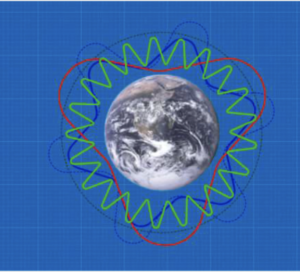
This is 24-hour cycle of direct current which changes throughout the day and the seasons.
Our brains also function off of DC energy.
Thus, when you are connected, your body can sync its circadian rhythm back to the proper time of day and correct season!
According to a paper published in the Biomedical Journal in 2023, your body can enter a “profound healing state” when you are hooked up to the Earth’s Carnegie Curve.
This kind of blew my mind.
The Science Behind Grounding- The Facts
When I dived into Google Scholar on this topic, I came across a bunch of scientific evidence for the benefits of grounding.
While I can’t list all, here are some of the more notable research papers I found:
The Effects of Electric Fields on Circadian Rhythmicity in Men.
This paper, published in Europe PMC, shows that blocking natural electric fields causes circadian rhythm to be disrupted.
It was published in the Journal of Life Sciences and Space Research in 1970.
The Bottom Line: The electrical fields emitted by the Earth help your circadian rhythm to sync to the proper time of day and season.
Earthing: Health Implications of Reconnecting the Human Body to the Earth’s Surface Electrons
Published in the National Library of Medicine in 2012, this study shows that when people are disconnected from the Earth’s natural source of electrons, they are likely to experience “physiological dysfunction and unwellness”.
The Bottom Line: When you are not grounded properly, you may experience a disruption in how your body functions, leading to illness.
The Biologic Effects of Grounding the Human Body During Sleep as Measured by Cortisol Levels and Subjective Reporting of Sleep, Pain, and Stress
This experiment showed that grounding using a conductive mattress pad caused a drop in cortisol levels and reduced stress. It also had participants report better sleep and reduce chronic pain.
It was published in the Journal of Alternative and Complimentary Medicine in 2004.
This was also corroborated by Clint Ober, who is a big supporter of the power of grounding.
He tried a small study, which you can find here.
He found that 100% of his participants reported an improvement in chronic pain conditions.
The Bottom Line: Grounding seems to drastically reduce pain!
The Effectiveness of a Conductive Patch and a Conductive Bed Pad in Reducing Induced Human Body Voltage Via the Application of Earth Ground
This study was published in the Journal of European Biology and Bioelectromagnetics in 2005.
It showed that when the body is grounded, it soaks up electrons from the Earth until it is equalized with the electric potential of the Earth.
Thus, you get a drop in overall voltage in the body.
The Bottom Line: When grounding, your body will absorb electrons until it is back to a homeostatic (normal) level, allowing your body to function with the right amount of voltage it needs to work optimally.
The Effect of Earthing (Grounding) on Human Physiology
Participants who were connected to a grounding patch on their feet showed a change in physiological readings that suggested reduced stress and reduced tension.
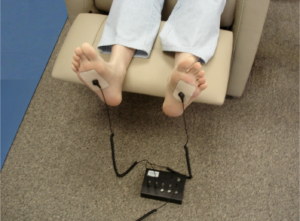
It was published in the European Biology and Bioelectromagnetics in 2006
The Bottom Line: Grounding has been shown to reduce symptoms of stress, including muscle tension.
Changes in Pulse Rate, Respiratory Rate, Blood Oxygenation, perfusion Index, Skin Conductance, and Their Variability Induced During and After Grounding Human Subjects for 40 Minutes
This cool experiment showed that when grounded, participants experienced a shift to a more relaxed state (by activation of the parasympathetic nervous system).
It also revealed an increase in oxygen variance in the blood, which suggests an increase in metabolic healing activity!
This was published in 2010 in the Journal of Alternative and Complimentary Medicine.
The Bottom Line: Grounding appears to shift you out of fight-or-flight mode into relax mode. It can also facilitate healing in the body!
Pilot Study on the Effect of Grounding on Delayed-Onset Muscle Soreness
This one’s for the athletes.
Grounding can reduce delayed onset muscle soreness (DOMS) after a workout. Additionally, grounding can result in less inflammation of the muscle that was worked out.
You can find this one in the Journal of Alternative and Complimentary Medicine, 2010 edition.

The Bottom Line: Grounding helps you recover from workouts faster and reduce post-workout pain, stiffness, and swelling.
Emotional Stress, Heart Rate Variability, Grounding, and Improved Autonomic Tone: Clinical Applications
Grounded participants experienced improved heart rate variability. This indicates that grounding can have a positive effect on your cardiovascular system.
It was published in 2011 in the Journal of Integrative Medicine.
The Bottom Line: Grounding can improve your cardiovascular function and can reduce the crazy changes in heart rate during times of heightened stress.
Earthing the Human Body Influences Physiologic Processes
Grounding may be a factor in regulating endocrine and nervous systems. Especially at night and during times of physical activity.
You can find this one in the Journal of Alternative and Complimentary Medicine, 2011 edition.
The Bottom Line: Earthing can help regulate hormones and help control your nervous system when engaging in sleep and physical activity.
Earthing (Grounding) the Human Body Reduces Blood Viscosity—a Major Factor in Cardiovascular Disease
This study showed a decrease in clumping of red blood cells after grounding and better blood flow, as can be found in the Journal of Alternative and Complimentary Medicine, 2013 edition.
The Bottom Line: Grounding can provide benefits for those who are diabetic and/or have cardiovascular disease by improving the flow of blood.
Can Electrons Act as Antioxidants? A Review and Commentary
Electrons from the earth can act as antioxidants and help fight inflammation.
The Bottom Line: When you ground, you absorb electrons from the earth, which can have an antioxidant effect. This can help relieve inflammation.
Anecdotal Evidence of Grounding
I did some searching around on the internet and found a ton of anecdotes from people who have tried grounding in different ways.
They have reported significant improvements in their health.
People speak of positive experiences using both grounding products and simply just walking barefoot on sand or grass.
People report:
- Drastically improved sleep
- Improvement in chronic pain
- A reduction in swelling and water retention
- Improved energy
To be taken with a grain of salt, here are some Anecdotes from around the Web:



However, the thing with anecdotes is that they are individual experiences and do not reflect the accuracy of scientific studies.
There has also been talk of some negative side effects when it comes to earthing.
It is always good to have a healthy amount of skepticism when considering other people’s experiences.
However, there is such a large volume of positive experiences out there that I found myself more intrigued to try it myself.
My Own Experience With Grounding
For starters, I am a TOTAL insomniac. I cannot even LOOK at caffeine without laying awake all night tossing and turning.
I am the type that has to have a perfect environment for me to nod off, thank goodness my husband can sleep soundly with our air conditioner running full-blast.
Before I discovered grounding, I had already put many different practices into place to improve my sleep. I was doing well, but something was missing.
I work indoors and am surrounded by electronics all day. So when I discovered the practice of earthing, I thought it could benefit me.
I started walking barefoot on the beach for at least 20 minutes every few days and noticed an immediate improvement in my ability to fall asleep faster and stay asleep.
I was SHOCKED (pun intended).
I thought that this could be due to having more sun exposure, or simply being outside and not necessarily to the grounding itself.
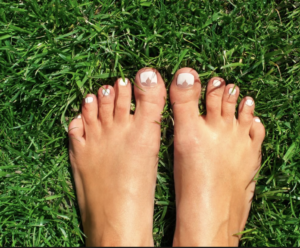
So I tried grounding after the sun went down and for only 10 minutes. I’d jump outside and put my feet on some wet grass.
Did I look like a nutter pouring a glass of water onto our front lawn and standing in it? Probably.
Did I sleep better that night? Sure did!
If I go a few days without grounding I notice a steep decline in my quality and amount of sleep.
It is my personal opinion that there is something to this. Even if it is a placebo effect, I found that it benefitted me!
Grounding Has Some Skeptics- The Myths
Since I want to be completely unbiased, I also want to acknowledge that some doctors disagree with the concept of grounding.
Dr. Steven Novella
One such critic is Dr. Steven Novella.
What he argues:
His main argument is that grounding may be considered a pseudoscience because there has been a lack of progress in scientific research.
In other words, there should be more research over time. I do agree that repetitive studies should be done to show the scientific rigour of a claim.
However, I do not think that a lack of new research directly points to the claim being false.
For example, there could be another reason there is a lack of research, such as a lack of funding, or a lack of scientists interested in studying the beneficial effects of grounding.
He also states in this article that,
“There is no evidence that these devices do anything. There is also no research establishing the basic underlying claim – that there is an electrical homeostasis that has any effect on how the body functions, and that this is affected by grounding.”
But do his arguments make sense?
However, when I was doing my research for this post, I did come across a few studies (here, here, and here) that used grounding devices that showed to have a beneficial effect on the body.
I also found a study that showed that with the use of a grounding patch, red blood cells did not clump together, as it increases the surface charge on the blood cells.
It also points to other studies that show that in diabetic patients, the electrodynamics of their blood was altered.
This suggests to me that there can be a disruption in the electrical homeostasis in the body.
Furthermore, with a grounding device, such as the foot patch used in this study, electric balance can be restored and help the red blood cells function naturally.
Dr. Novella also mentions that a lot of the studies done on grounding have a poor research design and have small study samples.
I totally agree. I would love to see some more studies done with larger sample sizes.
My main issue with Dr. Novella’s article is that he did not provide any scientific research to back up his claim that grounding is pseudoscience.
Conclusion
Overall, grounding seems to be a topic well worth looking into.
Is the science of grounding debunked? No. Not that I could find.
Although it has its skeptics, there are plenty of research studies to suggest that there are most likely benefits to our health and wellness when it comes to grounding.
Most of the skeptics and debunking articles I came across were opinions and lacked scientific studies to back up their claims.
I also noticed that there is more evidence to suggest that grounding works than evidence to suggest it doesn’t.
I particularly have noticed better sleep, along with others who have shared their experiences.
The great thing is that you can try grounding for free, just step outside your door without shoes!
There are also so many products available to help you ground inside your home or office, whether it’s a grounding mat or a grounding sheet for your bed.
Ultimately, you won’t know if grounding will help you in particular until you try it. So, I encourage you to take that first step and find a spare patch of grass.
Happy grounding!
Check out my post on grounding mats to find out if they work and the science behind them.
